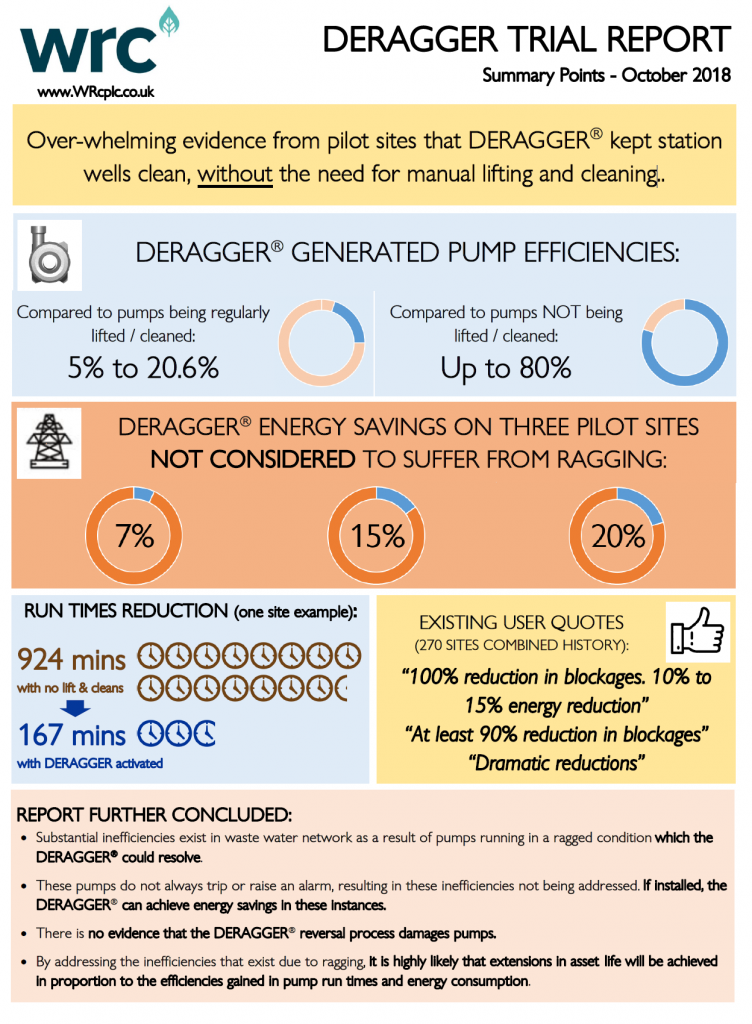 An independent trial into the DERAGGER, a device that prevents ragging in waste water pumps, has found it cuts energy consumption by up to 80%, significantly reduces maintenance requirements and helps to extend asset life.
An independent trial into the DERAGGER, a device that prevents ragging in waste water pumps, has found it cuts energy consumption by up to 80%, significantly reduces maintenance requirements and helps to extend asset life.
Manually lifting and repairing pumps costs utility companies across the USA billions of dollars.
The study delivered by the Water Research Centre (WRc) in conjunction with UK utility companies United Utilities and Wessex Water, found the DERAGGER to be an effective solution to these industry-wide challenges.
By analysing the torque of a pump, the device can detect items such as wet wipes and nappies in real time which could otherwise cause blockages. It can be triggered by even a few wet wipes and can automatically slow and reverse pumps to remove the potential blockage.
Running a pump when it is partially ragged, with an unstable current and unbalance impeller is known to cause significant wear and increase the amount of energy required.
During the 20-week trial, the DERAGGER minimised the need for manual cleaning at all testing sites. In one case, maintenance jobs decreased from nine to just one per month. At another site, no maintenance was required at all during a six-week period.
In addition, the DERAGGER reduced energy consumption by up to 80% for pumps which had not been recently cleaned and 20% for pumps which had been regularly lifted and cleaned.
Even in stations considered previously not to suffer from blockages, the DERAGGER achieved energy savings between 7% and 20%. The DERAGGER could therefore significantly reduce overall energy usage across the sector. The report also found that efficiency savings could deliver extensions to asset life.
Simon Crompton, DERAGGER Inc. managing director said: “We’ve known for some time that our technology can significantly reduce blocked pumps, which account for an estimated 90% of all unplanned work carried out in the sewage system. These independent findings confirm that our device has the functionality to tackle the problem head on, by preventing blockages from occurring in the first place.
“On pumps that don’t regularly suffer clogs, while we were confident the DERAGGER would make a noticeable difference, we did not know the full extent. These findings show that even on these stations the DERAGGER can significantly decrease energy consumption and improve asset life, confirming our device truly is revolutionary.”
Dr Leo Carswell, Head of Technolgoy at WRc said “Our thorough analysis of the raw data from five DERAGGER trail sites clearly demonstrates the impact this innovation can have in the waste water sector. We found it to demonstrably reduce pump blockages, and also signfifcantly reduce energy consumption – even on sites considered to be at low risk of blockages.”
Further information and a full copy of the WRc report can be found at: https://deragger.com/wrcreport/
-ENDS-
Issued by BIG Partnership on behalf of DERAGGER Inc. Hi-res images and interviews are available.
For more information please contact: Ashleigh Copeland T: +44 141 333 9585 M: +44 7808 330 153 E: ashleigh.copeland@bigpartnership.co.uk
Notes to editor: The DERAGGER was trailed by Water Research Centre (WRc), with the support of DERAGGER Inc. and employees of United Utilities and Wessex Water. Five pumping station sites were included in the trial. Four of these sites were wet wells and one was a dry well.
